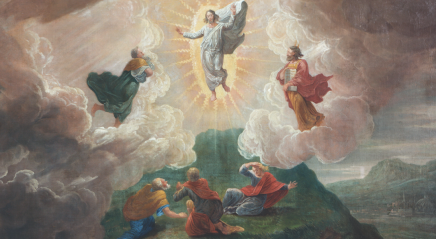Lectionary for March 2, 2025
Transfiguration of our Lord
Last Sunday after Epiphany
Exodus 34:29-35; Psalm 99;
2 Corinthians 3:12–4:2; Luke 9:28-36
Do you have a garment that makes you feel safe and confident? For me, it’s my Oxford button-down shirts. I just don’t feel as comfortable or prepared unless I have my sleeves rolled up, my top button unbuttoned, and my collar buttoned down. With this shirt, I’m ready to face the day, give the presentation or write the chapter.
Recently we had car trouble, so I had to walk across town to my office. I wore a hoodie because of the temperature. Long story short, I just wasn’t as productive and didn’t speak with colleagues much, because I was embarrassed to look unprofessional at the office. How we present ourselves matters. It reflects how we think about ourselves and shapes how others think about us. In the lectionary readings this week, we read about veiling and unveiling.
Exodus 34 and the horns of light shining from Moses’ face need to be put in context. In the first place, the reaction of the people of Israel shows how far they had fallen and how much intimacy had been lost as a result of the golden calf. Before the great sin, all the people saw God’s glory (Exodus 24:17), while the 70 elders and priests shared a meal with God and saw God directly (9-11). This is a pretty high degree of intimacy between humans and God, similar to Eden before Adam’s and Eve’s sin.
When the people created the golden calf, giving God’s glory to another human-made object, God was furious enough to annihilate the Israelites and those with them until Moses interceded (Exodus 32:9-14). The resulting separation and loss of intimacy was so profound that those who previously saw God’s glory directly were now terrified at seeing even the residue of glory on Moses’ face. How the mighty have fallen! Moses had to beg the same people who had previously looked God in the eye to look him in the eye (34:30-31)! Shame and guilt prevented God and the people from seeing each other as they once had. This is like the consequences in the Garden of Eden, where the humans learned they were naked, felt ashamed and sought a covering of protection.
Paul longs for a time when no one must cover their face, because everyone will know that their face bears the image and glory of God.
Paul adds another interpretive layer on the story. Rather than the people feeling fear and shame at seeing the prophet’s face, Paul locates the shame in Moses. The great prophet didn’t want the glory on his face to distract the Israelites from God’s ongoing work. We must note that 2 Corinthians doesn’t discuss the light on Moses’ face as fading (3:7, 13-14). That the glorious light fades is not recorded in Exodus, and “fades” is not a sustainable translation of katargoumenen/ou in this text (“Did the Glory of Moses’ Face Fade? A Reexamination of καρταργέω in 2 Corinthians 3:7–18” by William Baker. Bulletin for Biblical Research, 2000). Instead, Paul argues that Moses was modest because he wanted to make sure the people didn’t focus on the glory on his face but instead prepared themselves to also reflect the glory of the Lord as beheld in a mirror (18).
How often do we focus on the glory of God in someone else and spend all our time and energy coveting the gifts that God has given to another person? Paul longs for a time when no one must cover their face, because everyone will know that their face bears the image and glory of God.
In the Gospel lesson, Moses and Elijah don’t spend any time speaking with Jesus about his shiny face on the mountain of transfiguration. Instead, they talk of his impending departure (Luke 9:31). They know what it is to speak with God and to have their faces reflect God’s glory. They aren’t jealous of Jesus. Instead, they simply talk about God’s ongoing mission. It is only Peter, James and John who are beside themselves and don’t know what to say at seeing glorified faces. Happily, God steps in and delivers the message when Peter misses the plot: “This is my chosen one. Listen to him.”
What does this all mean? The Israelites at Sinai are ashamed of their sin and can not bear to see Moses’ face, let alone God’s! Paul argues that Moses was embarrassed about the way that his face might distract people from hearing the fullness of God’s good news. Peter simply wants to build tents for the shiny-faced folks on the mountain. In every one of these cases, humans are thinking about themselves and how they should react. Instead, we are called to simply be “transformed into the same image” by the Spirit (2 Corinthians 3:18). We aren’t called to be either jealous or ashamed, but to faithfully display all that God has made each of us to be!









